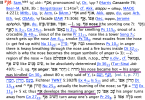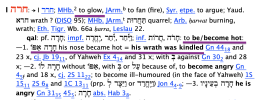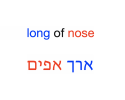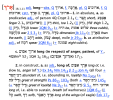Notice the sentence below: "his anger was kindled."
As soon as his master heard the words that his wife spoke to him, “This is the way your servant treated me,” his anger was kindled (Gen. 39:19).
Under this simple English clause lurks a Hebrew idiom. I colored coded each word to make it easy to see what I am talking about.

Literally those are the words of the idiom.
Here is the lexical support.


See HALOT vol. 1 p. 77 and p. 351.
It is pretty easy to see how this idiom came to be. Think about it. When someone get angry the face becomes flush (i.e. turns red) and they begin to breathe harder (i.e. huff and puff).
Just something I though some might find interesting.
As soon as his master heard the words that his wife spoke to him, “This is the way your servant treated me,” his anger was kindled (Gen. 39:19).
Under this simple English clause lurks a Hebrew idiom. I colored coded each word to make it easy to see what I am talking about.

Literally those are the words of the idiom.
Here is the lexical support.


See HALOT vol. 1 p. 77 and p. 351.
It is pretty easy to see how this idiom came to be. Think about it. When someone get angry the face becomes flush (i.e. turns red) and they begin to breathe harder (i.e. huff and puff).
Just something I though some might find interesting.






